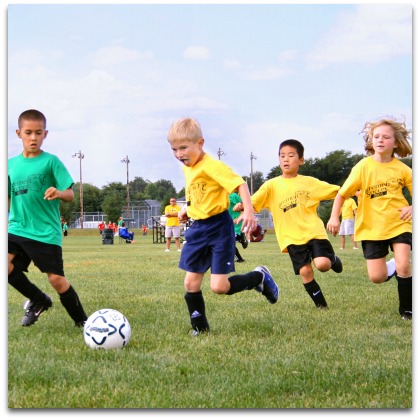
Over the last few years I have been blessed to witness my son do some amazing things that I admittedly would not have been able to do at the same age.
For example, his school held an evening lecture, and my son was asked to introduce the guest speaker in an auditorium filled with fellow students and parents. He calmly walked up to the podium and clearly read a lengthy introduction. Then he greeted the speaker with a firm handshake and took his seat in the audience.
If he was nervous, it didn’t show! I was wowed by his ability to rise to the challenge placed before him with such ease and grace.
It got me thinking — since I am not always confident — how is that I (and my husband) raised such a strong, confident child?
I reflected back to all the areas where we have specifically focused our attention over the years and concluded that a multi-disciplinary approach has been key to helping our son succeed in building self-confidence, inner strength and self-reliance. Our approach has focused on three primary areas: physical, mental and emotional.
As the saying goes, “A three-legged stool will not wobble!”
Physical

It’s a well-known fact that kids who participate in sports gain physical confidence, and involving your child in physical activity — especially in a social setting like a sports team or group of individual athletes — can help you raise a confident kid.
I have heard many parents over the years proclaim the benefit sports has played beyond the obvious improvement to physical fitness and endurance. You see, the benefits don’t stop on the court or field.
In an article called 7 Ways to Raise a Confident Child, Catherine Holecko explains that kids who are comfortable with different kinds of physical activity are able to take on new challenges, and this helps kids enjoy other pursuits.
In other words, lessons learned on the sports field carry over into other areas of life!
This fact is further illustrated in several studies like those described in Psychology Today. These studies found that “adolescents who participated in sports clubs had greater well-being, including being better socially adjusted, feeling less anxious and generally being happier about their lives.”
The level of participation can range from simple — like being involved in an activity just for fun — all the way to playing in a structured and highly competitive league.
It took several attempts to find the perfect sport for my son to excel at, but every sport he tried taught important lessons: from learning to be proud of trying his best, to sticking to a lengthy commitment, to persevering under pressure and even how to win and lose with grace.
The key to success in helping kids gain physical confidence is finding what they enjoy and encouraging them.
Mental

Success in academics is certainly a mental confidence builder, but there are a lot of activities (in and out of school) that help build mental strength, like playing chess and participating in debate, robotics, theatre, music, dance and art, just to name a few.
These types of activities help kids develop mental mastery by learning new skills while providing the intrinsic joy that comes from pursuing an activity for its own sake, rather than a predetermined outcome or extrinsic expectation.
My son loves to play video games, and when he started to get interested in them, I was skeptical. I thought the time he spent playing them would interfere with homework and lead to unsociability. (Not to mention that when I was growing up, video games got a bad rap!)
But instead of discovering that all video games were bad, I soon found that there are some good ones out there. The best video games can help kids develop problem solving, story telling, dexterity and creativity skills.
If you are not a gamer and need suggestions for appropriate video games, there are several websites, such as Common Sense Media, that list popular games by age group and give good descriptions so you can make an educated selection and make sure the game your kid wants to play is appropriate.
Does you kid get enough screen time already? There are many other creative outlets available at YMCAs, libraries and city recreation centers that offer a variety of classes in fine arts, crafts, music, dance, chess, robotics and more. Many are affordable and require very short-term commitments; most can be taken one class at a time.
The key to success in helping kids gain mental strength and confidence is to let them explore new interests for the sheer fun of it, and allow them time for self discovery and introspection, both key components to build mental self esteem and confidence.
Emotional

According to Child Encyclopedia.com, “emotional learning begins at every age, as children discover a wide range of emotions, and evolves as they grow.”
Emotional development and emotional intelligence affects all areas of relationships kids have with adults and fellow peers. It informs their interactions, including empathy, impulse control, self-regulation and social understanding. Emotionally confident kids are able to withstand peer pressure and bullying better than those without it, so it’s vital kids learn to develop it.
As simple as it sounds, the best way to help develop your kid’s sense of self-esteem and confidence is to tell them you love them, show them you care, take an interest in what concerns them and provide guidance when they need it.
According to the U.S. Dept. of Education, it’s important to help kids feel safe as they grow into their teen years. Ways to do this include talking to them about their feelings and anxieties, praising and encouraging them and providing opportunities for success as well as failure.
In recent years, schools have started to teach supplemental programs that help develop emotional confidence outside of the standard curriculum. My son’s school participates in a program called Character First, a research-based curriculum aimed at growing the leadership potential of students by teaching traits like honesty, gratitude, compassion, mutual respect and so on.
Other resources can include reaching out to school guidance counselors and the public library for materials on similar character-building and confidence-building programs.
The key to success is being actively involved in your child’s emotional development by providing a safe place where they can develop their own inner strength.
The Secret Weapon

Like I mentioned at the beginning, I have sometimes lacked confidence in areas of my life, and if you are like me, you have probably wondered, “Can I raise a strong, confident kid if I am lacking confidence?”
Absolutely! Allow your weaknesses to become your child’s strengths! Think of it like a hidden super power.
According to the Child Mind Institute, modeling confidence by taking on new tasks successfully is a key tool in your tool belt for raising a strong, confident child.
Here is a personal example: for years I feared public speaking, and my husband suggested I join Toastmasters International. I made excuse after excuse until a chapter opened up at my office. I finally decided to join, and over the course of a year, I overcame my fears and accomplished the goals I set for myself.
My son was able to witness my transformation as my confidence grew. I even became skilled enough to help evaluate his presentations. As I gained more confidence, I was helping him gain confidence, too!
Remember, confidence is built step-by-step, and it isn’t any one thing that makes the magic happen. Taking a multi-faceted approach will help your child “power-up” their self-confidence skills.
The Two-Minute Action Plan for Fine Parents
Here are some steps you can take to help you get started:
- How often do you really talk with your kids? Take an interest and check in with your kids often. Ask them how their day went!
- Do your kids understand their feelings? Work with them to help them examine their feelings, fears and anxieties.
- What can you do to mark important successes for your kid? Look for ways to celebrate every milestone and accomplishment.
- How can you be more encouraging? Recognize their efforts with positive reinforcement to show you have confidence in their skills, abilities and judgement.
- Remember, winning isn’t everything!
Long-Term Action Plan for Fine Parents
Here are some things you can try over the course of the next few weeks –
- It’s never too late to build confidence in areas you lack. Lead by example through modeling confidence-building and letting them see your journey, including both the ups and the downs.
- Have patience! “Rome wasn’t built in a day,” as the saying goes. Remember that kids develop at different rates, so try not to compare your kid against others too critically. It can take time to see results.
- Examine how you interact with your kid(s) and avoid the pitfalls that rob kids of confidence, including ongoing criticism, being overprotective or over-anxious, making negative comparisons and having unrealistic expectations. Help them build their confidence with a three-legged approach that focuses on the physical, mental and emotional!
Thank you for reaching out! I’m glad you found it useful.
Great read!! Thanks for sharing it with us, its really helpful.
Interested in what qualifies Laura Freeman to write this article for Positive Parenting. There is nothing wrong with the advice shared but her Bio only states cat lover, yoga, wife, mum & corporate professional – later isn’t very specific!
The articles on our site are “for parents from parents”. We believe that every parent in the trenches of everyday parenting has valuable experience and wisdom that other parents can benefit from. Laura has several such valuable insights to share from her own experience as a mom, and she has put in the effort to share it so clearly, in an easy to understand manner. That’s all the qualifications we need. ❤️